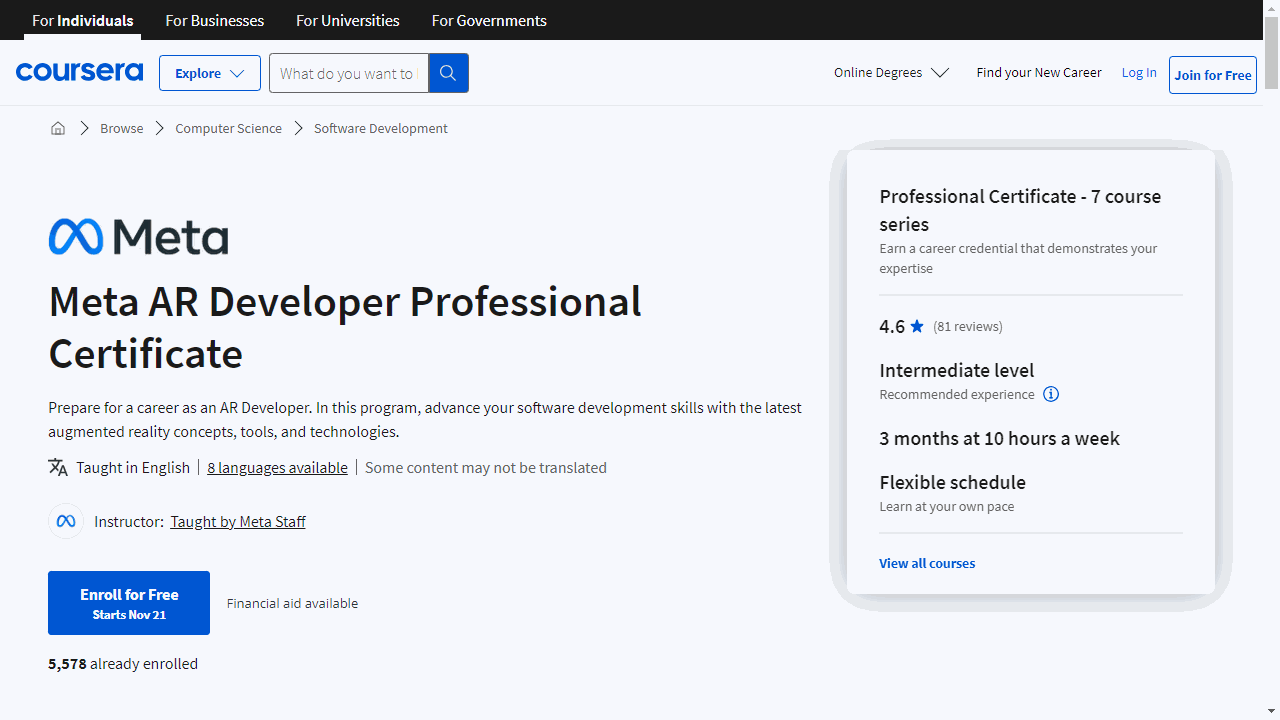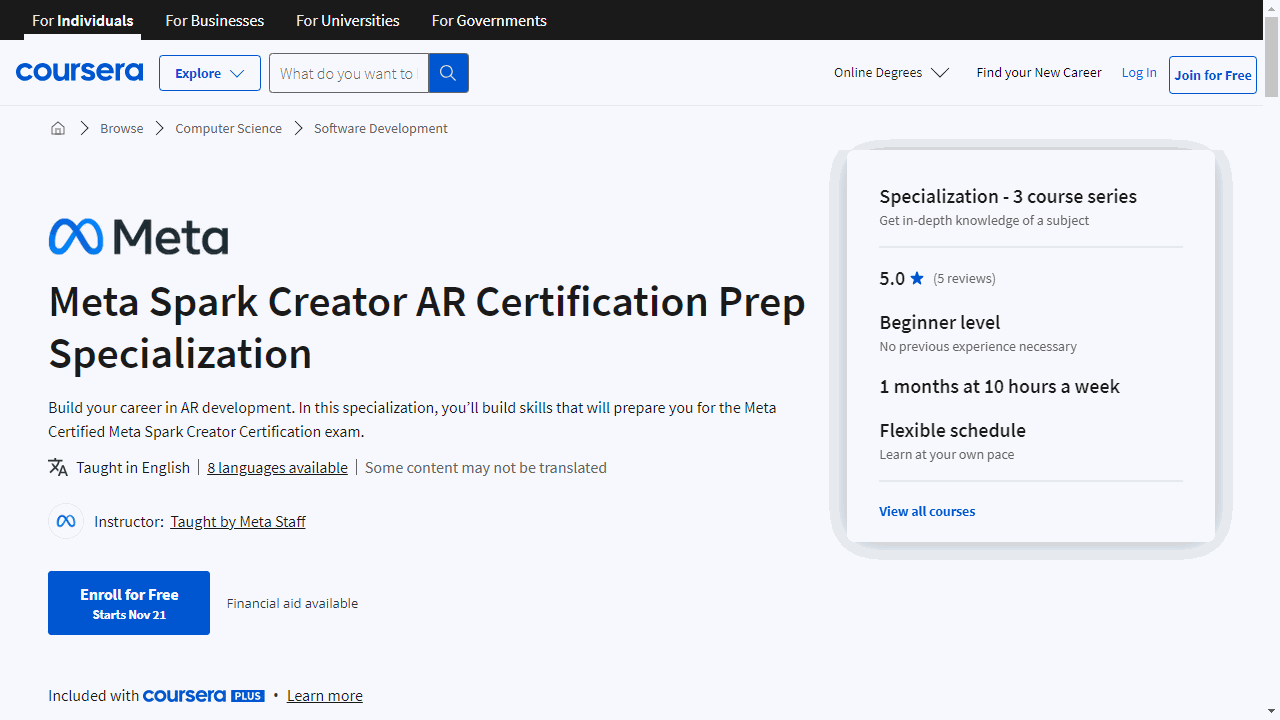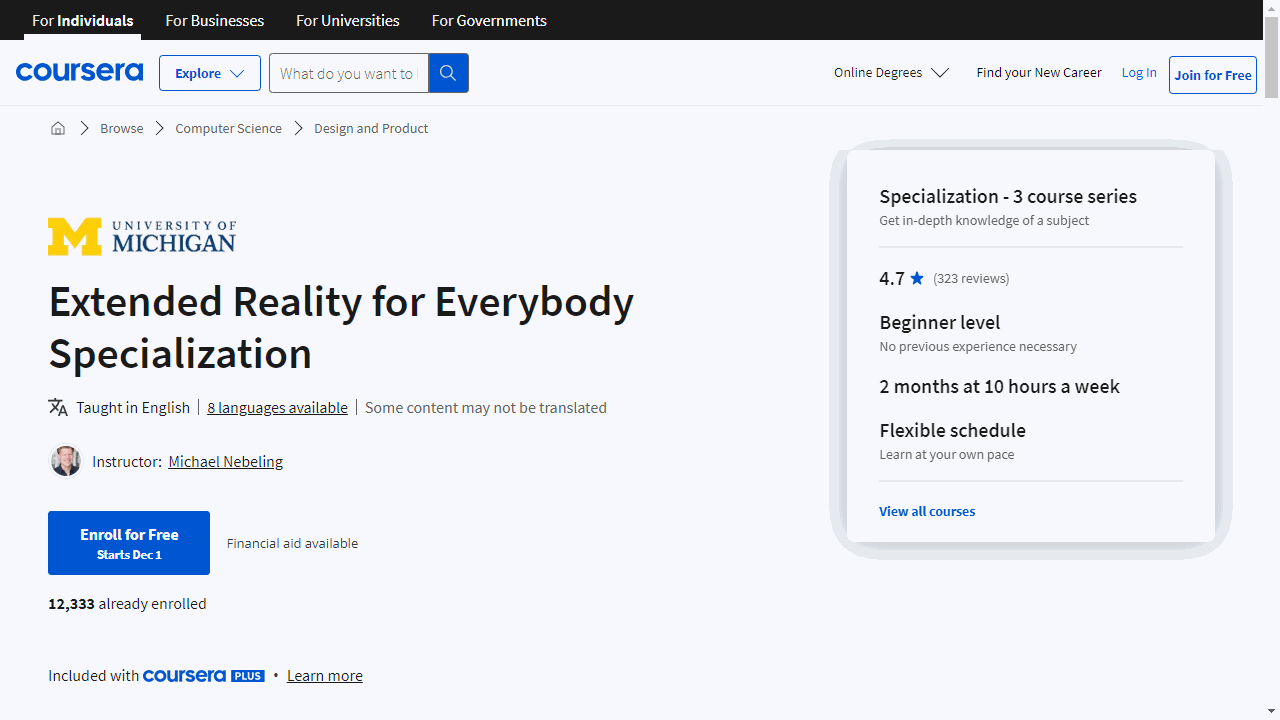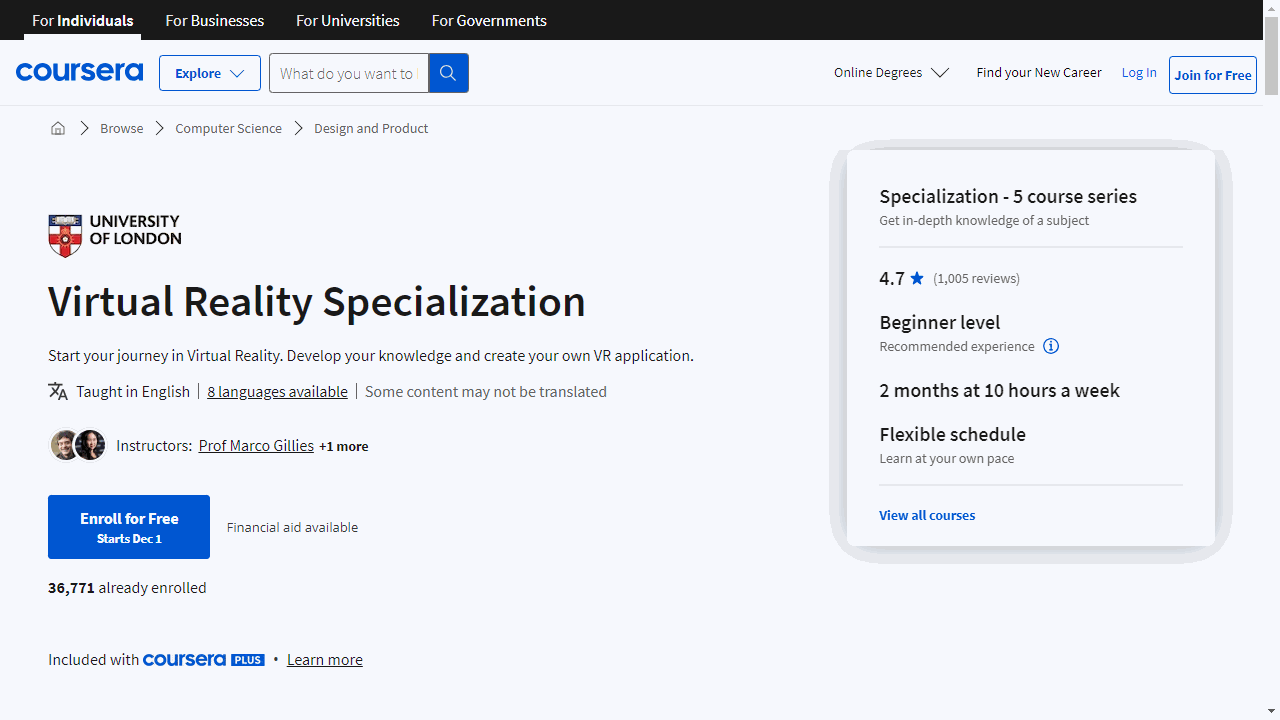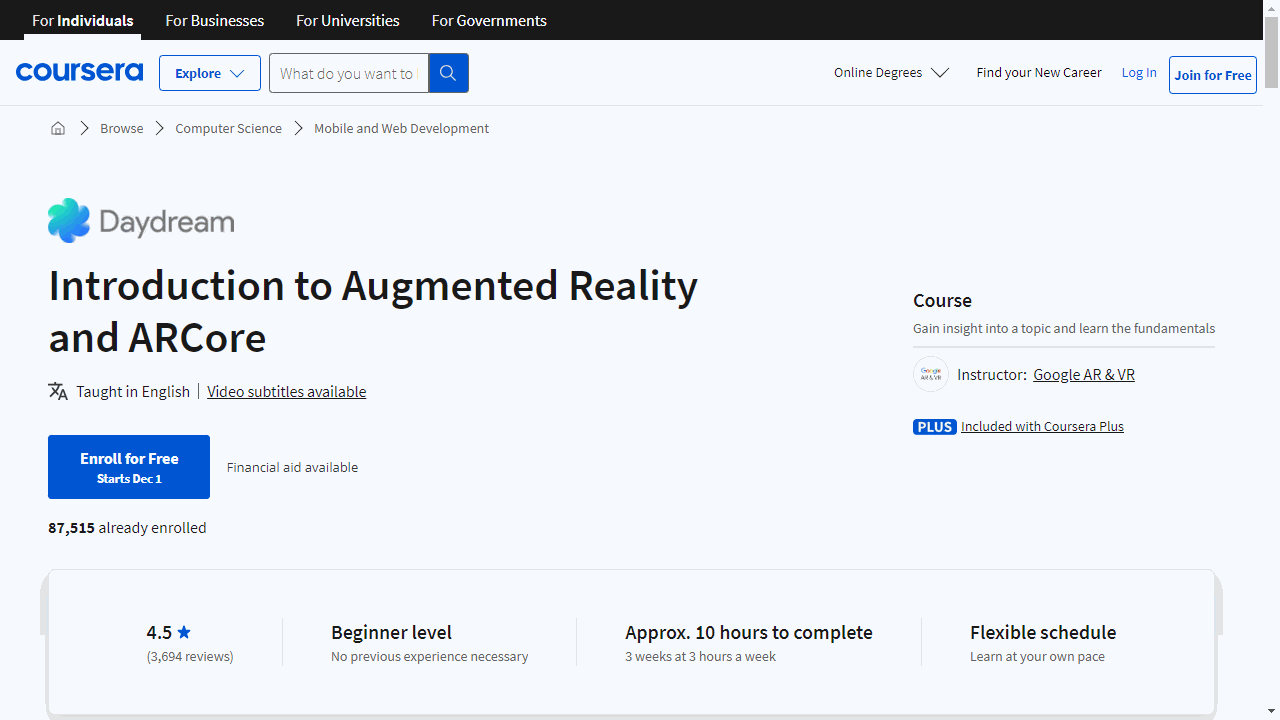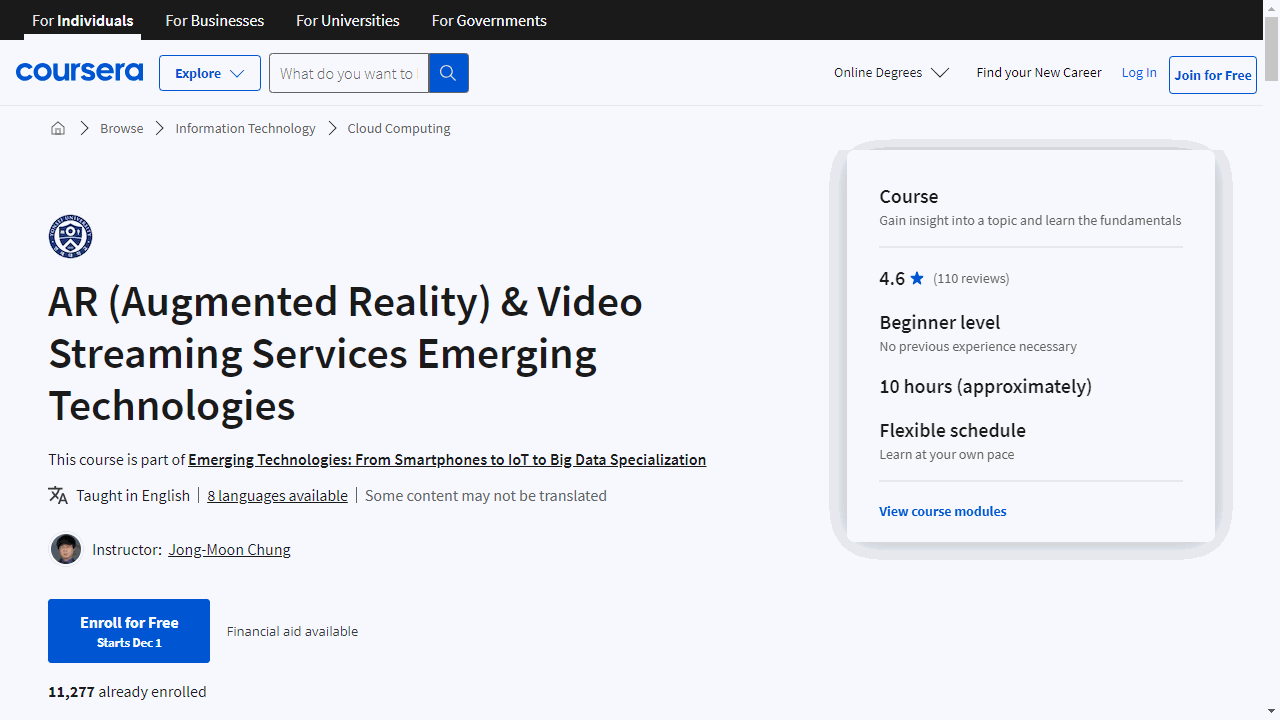Augmented reality (AR) is a technology that overlays digital information onto the real world, creating immersive experiences that blur the lines between the physical and digital.
AR is rapidly transforming industries, from gaming and entertainment to healthcare and education, offering new ways to interact with information, explore the world, and solve problems.
Learning AR can equip you with in-demand skills, opening doors to exciting careers in this rapidly growing field.
Finding the right AR course on Coursera can feel like searching for a needle in a haystack.
You want a program that covers the fundamentals, dives into practical applications, and is taught by industry experts.
For the best augmented reality course overall on Coursera, we recommend the Meta AR Developer Professional Certificate.
This comprehensive program provides a structured learning path, starting with the basics of AR and building upon those concepts through hands-on projects using industry-standard tools like Meta Spark, Unity, and Vuforia SDK.
This certificate is designed to equip you with the skills needed to develop compelling AR experiences for various platforms, making it a valuable asset for anyone seeking a career in this exciting field.
While this is our top pick, Coursera offers other great options for aspiring AR developers.
Continue reading to explore our recommendations for different learning styles and interests, including courses focused on specific AR platforms and applications.
Meta AR Developer Professional Certificate
The certificate kicks off with “Foundations of AR,” a course that lays the groundwork for understanding AR’s place within the broader context of extended reality (XR).
It’s not just about the cool factor of AR; you’ll delve into the practical applications and technologies that drive AR experiences, preparing you for a future where digital and physical realities converge.
Moving on, “AR in marketing using Meta Spark” equips you with the skills to craft compelling AR effects for social media campaigns.
This course isn’t just about learning a tool; it’s about understanding the principles of AR design and development that will serve you across various platforms and tools.
For web enthusiasts, “AR for web using JavaScript” offers a deep dive into creating browser-based AR experiences.
You’ll harness the power of PlayCanvas and JavaScript to build educational content that’s interactive and immersive, making learning an engaging adventure.
“Unity and C# basics” is where gaming and AR intersect.
Unity is a cornerstone of AR development, and this course will have you navigating its interface, managing assets, and scripting in C# to bring your game ideas to life.
You’ll learn to create games that offer a new dimension of interaction through AR.
Building on your Unity skills, “Using AR Foundation in Unity” introduces you to AR Foundation, a tool that enhances your ability to develop sophisticated AR games.
You’ll tackle concepts like marker detection and game dynamics, ensuring your creations are not just fun but also technologically robust.
“AR games using Vuforia SDK” expands your toolkit with the Vuforia SDK, another Unity-compatible tool that specializes in plane tracking.
Here, you’ll apply your skills to develop an AR bowling game, learning how to create games that interact with the user’s environment in real-time.
The capstone of the certificate, “Meta Spark Creator AR Certification,” is your stepping stone to official recognition as a Meta Certified Meta Spark Creator.
This course is designed to consolidate your learning and prepare you for the certification exam, a credential that can significantly bolster your professional profile.
Each course in the certificate builds upon the last, ensuring a structured learning path that gradually enhances your AR development skills.
While some experience with object-oriented programming and web development is recommended, the courses are designed to be accessible and build upon your existing knowledge.
This certification is a thoughtful compilation of courses that provide not just technical skills but also an understanding of how AR can be applied across various industries.
Meta Spark Creator AR Certification Prep Specialization
Exploring the realm of augmented reality (AR) can be a transformative step in your career, and the “Meta Spark Creator AR Certification Prep Specialization” on Coursera is a comprehensive pathway to mastering this innovative technology.
The journey begins with “Foundations of AR,” a course that lays the groundwork for understanding AR’s place within the broader context of extended reality (XR).
You’ll delve into the practical applications of AR, learning how it’s transforming industries from marketing to education.
The course also demystifies the technologies behind AR, including computer vision, and walks you through the software development lifecycle.
A background in programming and web development will help you absorb the material more effectively.
Moving forward, “AR in marketing using Meta Spark” equips you with the skills to craft engaging AR experiences specifically for marketing.
You’ll become proficient with Meta Spark tools, learning to create, optimize, and deploy AR effects that can captivate an audience.
This course is particularly valuable for those looking to leverage AR in digital marketing strategies.
The capstone of the specialization is the “Meta Spark Creator AR Certification” course.
It’s designed to prepare you for the Meta Certified Spark Creator exam, ensuring you have the knowledge and resources to succeed.
Access to this course is exclusive to those who have diligently worked through the preceding modules, ensuring a solid foundation of skills.
Throughout the specialization, you’ll gain a robust set of competencies, from understanding the XR spectrum to applying AR in various sectors.
It’s an investment in a skill set that’s increasingly relevant in our tech-driven world, opening doors to creative and cutting-edge career opportunities.
Extended Reality for Everybody Specialization
This is a comprehensive program that equips you with the knowledge and skills to navigate the expanding universe of XR, which includes AR, VR, MR, and beyond.
The specialization begins with “Intro to AR/VR/MR/XR: Technologies, Applications & Issues,” a course that lays a solid foundation.
You’ll gain clarity on the nuances of various XR technologies and their applications.
It’s not just theory; you’ll evaluate the potential and limitations of XR, and the honors track offers practical experience in assessing and designing XR solutions.
Moving on to “User Experience & Interaction Design for AR/VR/MR/XR,” this course is a deep dive into the creative process of XR design.
It’s about crafting user experiences that resonate.
You’ll learn through design thinking and prototyping, with a focus on ethical considerations.
The honors track here is particularly hands-on, guiding you through the creation of storyboards and prototypes, ensuring your designs are not only innovative but also user-centric.
Lastly, “Developing AR/VR/MR/XR Apps with WebXR, Unity & Unreal” transitions you from design to development.
This technical course demystifies the development platforms and tools essential for creating XR applications.
You’ll get to grips with Unity and Unreal, and the honors track provides a structured approach to building and implementing your own XR projects.
Each course in the specialization is rich with relevant skills and practical exercises, ensuring you’re not just learning, but applying what you learn.
The focus on ethics, accessibility, and privacy ensures you’re prepared to create responsible XR applications.
Virtual Reality Specialization
The specialization starts with “Introduction to Virtual Reality” to grasp the essentials of VR, including hardware like the Oculus Rift and HTC Vive, and the history of VR.
This foundational course equips you to assess VR applications and create your own using Unity, regardless of your prior experience.
“3D Models for Virtual Reality” transitions you from theory to practice.
Learn to craft 3D objects and immersive environments with realistic textures and sounds, all while optimizing for VR performance.
Unity3D serves as your creation tool, striking a balance between ease of use and professional capabilities.
In “3D Interaction Design in Virtual Reality,” the focus shifts to user engagement within VR.
You’ll explore natural body movements for interaction, moving beyond traditional button presses.
This course culminates in a project that solidifies your understanding of VR interaction principles.
“Building Interactive 3D Characters and Social VR” delves into the social dynamics of VR.
It covers the psychology behind virtual interactions and teaches you to animate and program 3D characters that respond to human cues, preparing you for the burgeoning field of social VR.
Lastly, “Making Your First Virtual Reality Game” synthesizes your learning into a capstone project.
From conceptualization to execution, you’ll create a VR game or experience, drawing on insights from industry veterans to polish your final product.
Introduction to Augmented Reality and ARCore
This course is a thorough primer, offering a blend of historical context and cutting-edge application across various sectors, from gaming to healthcare.
You’ll start with the basics, understanding AR’s evolution and its current role in our daily lives.
The course doesn’t just skim the surface; it dives deep into the technical workings of ARCore, Google’s AR platform.
You’ll learn about asset placement, scaling, and lighting—key elements that make AR experiences feel real.
Technical constraints are part of any technology, and AR is no exception.
This course equips you to navigate challenges like device limitations and environmental factors.
You’ll gain insights into tracking technologies, both outside-in and inside-out, and understand motion tracking’s role in creating seamless AR.
The course also emphasizes the importance of user experience.
You’ll explore UX and UI design principles, ensuring your AR creations are not only impressive but also intuitive and user-friendly.
Practical checkpoints throughout the course allow you to assess your understanding and apply what you’ve learned.
Tools like Poly and Unity are introduced, providing you with the resources to craft your AR content.
By the end of the course, you’ll have a solid foundation in ARCore mechanics and the confidence to use these tools effectively.
AR (Augmented Reality) & Video Streaming Services Emerging Technologies
It begins with an introduction to AR, clarifying how it differs from VR and setting the stage for its practical applications and potential business impacts.
The syllabus promises a deep dive into AR’s technical aspects, covering system components, workflow, and feature detection technologies like SIFT, SURF, and ORB.
These are the building blocks of AR that enable immersive experiences, and understanding them is crucial for anyone serious about entering the field.
Beyond AR, the course also explores the technicalities of video streaming services.
You’ll gain insights into the workings of platforms like Skype and YouTube, including the codecs that ensure smooth video playback.
The discussion extends to streaming networks, video frames, HTTP, and MPEG-DASH, offering a rounded understanding of the streaming ecosystem.
Content Delivery Networks (CDNs) are another focus area, highlighting their role in efficient content distribution.
You’ll learn about CDN market trends and the technologies that optimize streaming performance.
Real-world applications, such as the AR-enhanced IKEA Catalog and Google Translate, demonstrate how AR technology is already being integrated into consumer experiences.
These case studies show the practical application of the concepts covered in the course.
Finally, a project with peer review offers a hands-on opportunity to apply your learning and receive constructive feedback, cementing your knowledge and preparing you for real-world challenges.
Also check our posts on:
